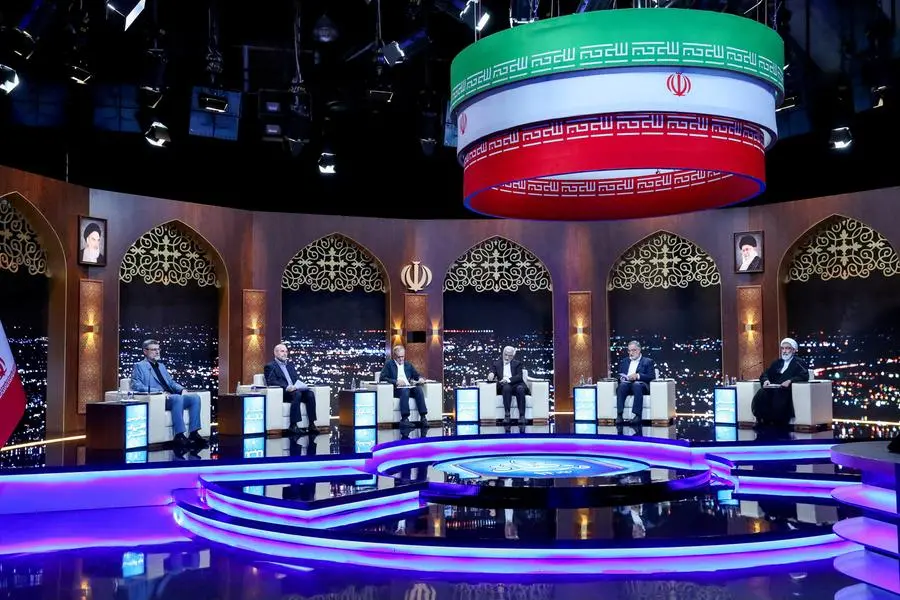PHOTO
The Iranian presidential elections have entered a new phase of competitiveness with the start of the first of five rounds of television debates between candidates.
In this round, which ended late Monday, the candidates of the fundamentalist party defended the performance of the government of the late Iranian President Ebrahim Raisi and attacked the government of his predecessor Hassan Rouhani, holding it responsible for the economic deterioration that the country is suffering from.
The two fundamentalist candidates, Ali Reza Zakani and Qazi Zadeh Hashemi, took on the task of attacking Rouhani's government, while Mohammad Baqir Qalibaf and Saeed Jalili avoided entering debates and direct confrontations with the rest of the candidates.
In this regard, Zakani, who is known for his harsh criticism of the nuclear agreement, attacked foreign policy during the era of Rouhani's government, saying, "You have tried the diplomatic policy of pleading to others, and this is not a solution." On his part, Qazi Zadeh Hashemi said, "they handed over the government's debts to my president and we saw how the country was managed and how the budget deficit was addressed." On the other hand, the reformist candidate Masoud Pezeshkian defended his performance and professional record in the health sector and his role within the parliament, denying at the same time any connection to the Rouhani government and its performance.
Pezeshkian called for forming a government of technocrats and experts, regardless of their political and party affiliations, and putting aside differences, with the need to deal with the countries in the region and the world to improve the living situations of the citizens.
The Western embargo and the deteriorating economic conditions overshadowed the atmosphere of the first round of debates, the focus of which was discussing the economic situation, as some of the fundamentalist party's candidates held Rouhani's government responsible for those sanctions and its mismanagement.
In this regard, the prominent fundamentalist candidate, Muhammad Baqir Qalibaf, said, "the ban certainly has an impact, and we must work to abolish it, and we have clear and specific plans in this regard." For his part, Mustafa Pourmohammadi stressed the difficult economic conditions, noting, "for two decades we have been facing the international embargo. Some say the embargo is not important and they continue to repeat that, while the world imposed harsh sanctions on us, and we simply pass through them." "They attack an embassy and thus impose economic and political consequences on the country and increase the sanctions. In addition, we are internally increasing the embargo daily. We will certainly fail in addressing the external embargo and we must change our methods and vision on the external issues," he continued.
"Our commercial relations with the world are closed, and we must deal with the world to provide the needs and requirements of citizens," he added.
As for the other fundamentalist candidate, Saeed Jalili, he called for controlling the hard currency market, saying, "If the foreign exchange market, which affects the rest of the markets, is controlled, most of the problems will be solved." He called for strengthening the value of the local currency, adding, "One of the ways to control inflation in the country is to raise the value of the local currency." The second round of live television debates is scheduled to be held next Thursday, on the 20th of this June, followed by the third round just one day later, on the 21st of the same month.
The Iranian presidential elections are scheduled to be held on June 28, following the vacancy of the presidency due to the sudden death of President Ebrahim Raisi in the helicopter crash carrying him and his companions on May 19. (end) mw.bb
All KUNA right are reserved © 2022. Provided by SyndiGate Media Inc. (Syndigate.info).





















